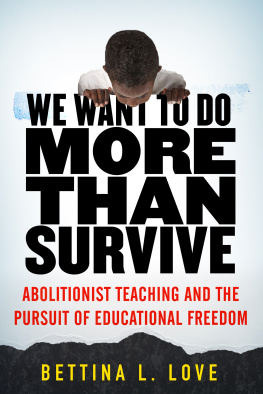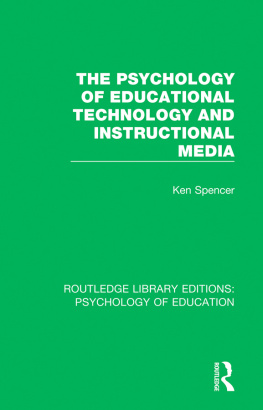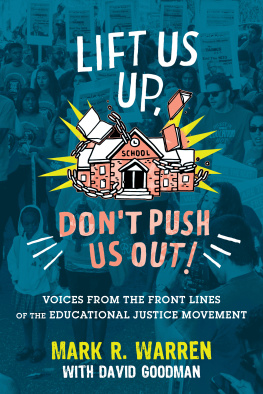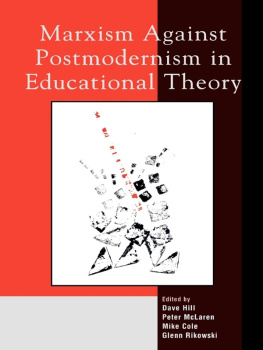Table of Contents
Guide


My mission in life is not merely to survive, but to thrive; and to do so with some passion, some compassion, some humor, and some style.
MAYA ANGELOU
CHAPTER 1
WE WHO ARE DARK
What do we want? What is the thing we are after? We want to be Americans, full-fledged Americans, with all the rights of other American citizens. But is that all? Do we want simply to be Americans? Once in a while through all of us there flashes some clairvoyance, some clear idea, of what America really is. We who are dark can see America in a way that white Americans cannot. And seeing our country thus, are we satisfied with its present goals and ideals?
W . E . B . DU BOIS
W E WHO ARE DARK . WE WHO ARE DARK . WE WHO ARE DARK . When I read Du Boiss words for the first time, they seemed to lift right off the page, as if they were meant expressly for me. Du Boiss indictment of America is plain and simple, yet at the same time shattering, because we as dark people seewhich White Americans cannota country with enough promise to capture and hold four hundred years of freedom dreams while systematically attacking, reducing, and/or destroying each and every aspiration. So, what do we want, knowing what we know? What is this thing we are after? Although no one person is equipped or has the right to speak for millions, particularly on the issues of race and racism, there is one thing that I know with everything I am: we who are dark want to matter and live, not just to survive but to thrive. Matter not for recognition or acknowledgment but to create new systems and structures for educational, political, economic, and community freedom. It would mean we matter enough that our citizenship, and the rights that come with it, are never questioned, reduced, or taken away regardless of our birthplace or the amount of melanin in our skin. Mattering, citizenship, community sovereignty, and humanity go hand in hand with the ideas of democracy, liberty, and justice for all, which are the unalienable rights needed to thrive.
This book is about mattering, surviving, resisting, thriving, healing, imagining, freedom, love, and joy: all elements of abolitionist work and teaching. Abolitionist teaching is the practice of working in solidarity with communities of color while drawing on the imagination, creativity, refusal, (re)membering, visionary thinking, healing, rebellious spirit, boldness, determination, and subversiveness of abolitionists to eradicate injustice in and outside of schools.
To begin the work of abolitionist teaching and fighting for justice, the idea of mattering is essential in that you must matter enough to yourself, to your students, and to your students community to fight. But for dark people, the very basic idea of mattering is sometimes hard to conceptualize when your country finds you disposable. How do you matter to a country that is at once obsessed with and dismissive about how it kills you? How do you matter to a country that would rather incarcerate you than educate you? How do you matter to a country that poisoned your childs drinking water? How do you matter to a country that sees your skin as a weapon? How do you matter to a country that steals your land, breaks treaty after treaty, and then calls you a savage? How do you matter to a country that tears families apart because of arbitrary lines that instill terror, violence, and geographical separation rather than a compassion for humanity? How do you matter to a country that will ban you because of how you pray and who you pray to? How do you matter to a country that ultimately only sees you as property or a commodity? How do you matter to a country that rips children out of the hands of their parents and locks them in dog cages for seeking a better life? How do you matter to a country that measures your knowledge against a gap it created? How do you matter to a country that labels you a model minority in order to fuel anti-Blackness? How do you matter to a country that would rather arm teachers with rocks than have courageous conversations with itself about gun control, eliminating guns, and White male rage? How do you matter to a country where the idea of consent seems alien to its conquering culture? How do you matter to a country where the president calls immigrants animals, particularly those from Mexico? How do you matter to a country where Betsy DeVos, a billionaire heiress and staunch advocate of privatizing public education, who refuses to protect our most vulnerable students in public schools, is the secretary of education? How do you matter to a country that is incapable of loving dark bodies and, therefore, incapable of loving you?
We who are dark are complexwe are more than our skin hues of Blacks and Browns. We intersect our moonlit darkness with our culture(s), language(s), race(s), gender(s), sexuality(ies), ability(ies), religion(s), and spirituality(ies). Our complicated identities cannot be discussed or examined in isolation from one another. These identity complexities, which create our multifaceted range of beings, must matter too.
Kimberl Crenshaw refers to these multiple markers of identity as intersectionality. Intersectionality is not just about listing and naming your identitiesit is a necessary analytic tool to explain the complexities and the realities of discrimination and of power or the lack thereof, and how they intersect with identities. The idea of intersectionality is not new; Black women writers and thinkers throughout history, like Anna Julia Cooper, Audre Lorde, Angela Davis, Frances Beal, Patricia Hill Collins, and the women of the Combahee River Collective, articulated the need to discuss race and gender together, understanding that multiple oppressions reinforce each other to create new categories of suffering. Further, intersectionality cannot be conflated with diversity. Diversity is a catchall term that includes different types of people in terms of race, gender, sexuality, or religion within an organization, community, company, or school. Intersectionality is more than counting representation in a room or within a group; it is understanding community power, or its lack, and ensuring inclusivity in social justice movements. It is a way to build alliances in organizing for social change.
For example, there was a significant need for an intersectional lens when, in 1991, law professor Anita Hill accused US Supreme Court nominee Clarence Thomas of sexual harassment during his tenure as her boss at the US Department of Education and the Equal Employment Opportunity Commission. Many Americans, including many folx of color, did not believe Hill simply because she was a Black woman calling out a high-profile Black man. Thomas called the allegations a high-tech lynching to invoke Black male racial suffering and simultaneously erase Black womens history of racial and sexual trauma. Thomass lynching comment caused people to view the case through the lens of race and racism, but only from a male perspective. His rhetorical maneuver painted Hill as a bitter Black woman trying to bring a Black man down like so many White people had done before. Thus, while diversity was present in the proceedings involving a Black man and a Black woman, both of them extremely accomplished, Thomass male privilege, along with Americas ignorance and outright disregard of Black womens own history of lynchings and sexual trauma due to assault, harassment, and rape, made it easy for America to ignore Hills accusations. And even today, we see the high-tech lynching claim used to excuse Bill Cosbys numerous sexual assaults. Intersectionality would have allowed both race and Black womens history of sexual trauma to enter the conversation.









